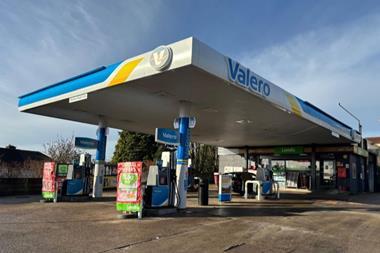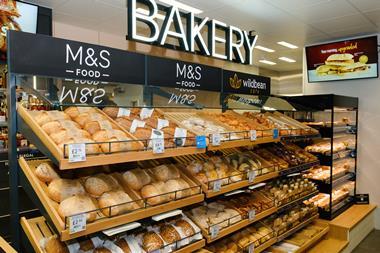The lorry driver has a worried look on his face, will his truck fit under the low canopy on the Esso the forecourt?
Steadily he edges it in, and looks relieved as the vehicle makes it to the pump - just.
Forecourt manager Claire Sinden watches it all from the entrance of her site shop in Jersey, also with a relieved expression on her face.
"They aren’t all that lucky," she grins. "We’ve had quite a few near misses. If someone drives in with a 4x4 that has a canoe on the top, they can get stuck. We even had a fire engine stuck under there once."
Claire’s Co-op site is one of the busiest in Jersey, accounting for 12.5% of the island’s fuel sales, but it also needs to have one of the lowest canopies due its location - it is directly under the flight path to Jersey Airport.
She says: "We’re so near the airport, and right under the flight path, you can basically see the faces of the passengers going past in the planes.
"So when we decided to revamp the site five years ago, we were told the canopy could not be above a certain height. It created a few problems but we managed to get round them."
According to the Co-op, the canopy on the bustling Esso forecourt is just 2.7m high, compared to the usual 4.5m in the UK.
There were even restrictions on what materials could be used to build it - aluminium rather than steel so the material did not interfere with the planes’ radar. Certain types of shrubs and bushes also had to be specially ordered and planted - the types that would not attract birds, as the authorities did not want birds straying into the flight path.
== Traditional values ==
Claire, who moved to Jersey from her native Norwich 11 years ago to study hotel management, says the site sells 65,000 litres per week - a respectable amount on an island of Jersey’s size.
The site also has a popular and well-stocked store which, like much of the rest of Jersey, is keen to keep hold of its old fashioned values.
"Jersey is very traditional," she says. "It’s one of the things I like about working and living here.
"We get a lot of local customers and we know most of them by name. It’s a very successful site, but without many of the hassles you get on the mainland. For example, we don’t have to be open 24/7, there’s just not enough demand to justify it. So all this makes for a slower and more pleasant pace of life."
The site certainly believes in keeping up old traditions. It’s still got the Dividend scheme, with Dividend Stamps in the stores - 4p back for every £1 spent on goods in the shop. It also still runs the Dividend for fuel - where instead of stamps, customers get cashback, money to use on goods in store, or money paid directly into their bank account at certain times of the year.
The scheme is incredibly popular in Jersey and also in Guernsey, with more than 100,000 members - meaning virtually every adult living on the islands uses it. The Co-op has been trading in Jersey since 1919, and while it is a member of the Cop-op trading group, it is totally independent.
Today, there are nine Co-op c-stores in Jersey, plus two bigger Grand Marche stores. Claire’s site is one of 13 Esso forecourts on the island.
Alcohol
Another feature of forecourt life you notice as you drive round Jersey is the lack of liquor licences in-store. Until recently, forecourts weren’t allowed to sell alcohol. The rules stated that if they wanted a liquor licence, the alcohol had to be housed and sold in a separate building.
Claire says: "It’s only in the past five months or so that they’ve relaxed the laws on selling alcohol in forecourts, and we’ve only just started selling it on site.
"There are still restrictions though, the alcohol has to be in view of the till when it’s on the shelves, so at the moment we’re having to rethink our layout a bit as it means we can’t have any alcohol in the chillers."
The site, on the busy La Route de Beaumont, is open from 7am to10pm Monday to Saturday, and from 7am to 7pm on Sundays.
And Claire believes one of the reasons it is so successful is that the store prices are kept the same as in the bigger Co-op stores in town.
Another major issue and talking point on the island is last month’s introduction of a local form of VAT. As an off-shore tax haven, Jersey residents and visitors have long enjoyed certain privileges. But all this has now changed.
The goods and services tax (GSK), introduced after pressure from the EU on off-shore tax locations, has forced residents to pay 3% tax on their goods and services for the first time.
And the unpopular tax covers everything, including many items which are VAT-free on the mainland, such as food, newspapers, books and children’s clothes.
Jim Hopley, chief executive of The Channel Islands Co-operative Society Ltd, says the introduction has caused huge headaches for local retailers.
Jim says: "We bring in a lot of product from the UK which does not carry VAT - for example ready meals. They may arrive ready priced, with say £2.99 on the pack. But we’ve then got to sell them for £3.08.
"The island previously raised a lot of revenue from off-shore finance, but there is EU pressure to even out off-shore tax regimes, leaving a potential black hole in the island’s finances by 2010."
Jim says other products like newspapers and magazines are also causing retailers major grief. If a newspaper is priced at 40p in the UK, retailers in Jersey can’t just sell it straight on to customers at that price, they have to add the 3% to the cover price in-store.
"It’s very complicated," sighs Rob. "I don’t think it’s been properly thought through at all. For us and many other businesses in the area, it’s really screwed up the issue of shipping produce in from the UK."
Another issue in the Channel Islands is getting fresh produce to stores.
"We’re totally dependent on boats for transporting goods," says Rob. "We do access some products from the Co-op distribution centre on the mainland, but we have to get the bulk of our ambient products from our own distribution centres on the island.
"There’s a 24-hour delay in getting products from the mainland, so if something has a three-day shelf life on the mainland, we lose a day on the shelf life. It can be hard getting stuff across the water and over here, especially in the winter months if there’s bad weather.
"So we would not even consider bringing items like fresh sandwiches in. M&S can do it at their site on the island, but they have a very structured distribution chain.
"For us, on the other hand, there are so many links in the chain that it’s impossible. We can’t move it quickly enough."
== Restrictions ==
To further complicate matters, although the island is geographically nearer to France than England, there is only one major freight delivery from France per week. Rob says the company mainly uses this delivery to stock up on French products like cheeses and other produce which have a longer shelf life, but it can’t be relied on for any other type of products.
Rob adds: "There are certain restrictions on forecourt and other businesses on the island - like the fact that it is illegal to import any milk. This is designed to protect the local dairy here as well as the Jersey indigenous herd.
"Our policy is to buy produce locally as much as possible anyway if we are able to.
"But we’re by no means self-sufficient on the island - for example, there is very little fruit grown here apart from strawberries, and the island doesn’t produce nearly enough meat to keep up with demand."
Regarding the fuel side of the business, there are also many differences to running a forecourt on the mainland.
A full tank of petrol in a car will usually last for about four to five weeks in Jersey, and as the island is so small, the average motorist only clocks up about 3,000 miles a year at the most.
Rob says: "There are more cars per household here than anywhere in the world - about 3.3 per household, according to the latest figures. There are about 60,000 cars in Jersey, and the population is only 90,000. Some of the fuel sales are also taken up by hire cars for holidaymakers of course.
"One of the problems we have in terms of petrol and fuel sales is that our garages are now running full to capacity.
"And whereas on the mainland a fuel drop might be 40,000 litres, here the deliveries are much smaller and most sites get a delivery a couple of times a week. On Guernsey it’s almost a daily delivery.
"I suppose there are too many petrol stations here really. The attrition in petrol stations that has hit the mainland hasn’t started here yet.
"But I have no doubt at all that it will come."
----
=== Jersey Facts ===
l The maximum speed limit in Jersey is 40mph.
l There were a total of 104,537 cars registered in Jersey at the end of 2006.
l The island measures just nine miles by five.
l St Helier is the capital.
l Jersey has very strict housing laws - it is only possible to buy a property after residing on the island for 12 years.
l Jersey has a population of about 90,000, plus 365,000 visitors a year - mostly in the summer.
l The governing body of the Island is the States of Jersey, presided over by the Bailiff, who is also President of the Royal Court.



























No comments yet